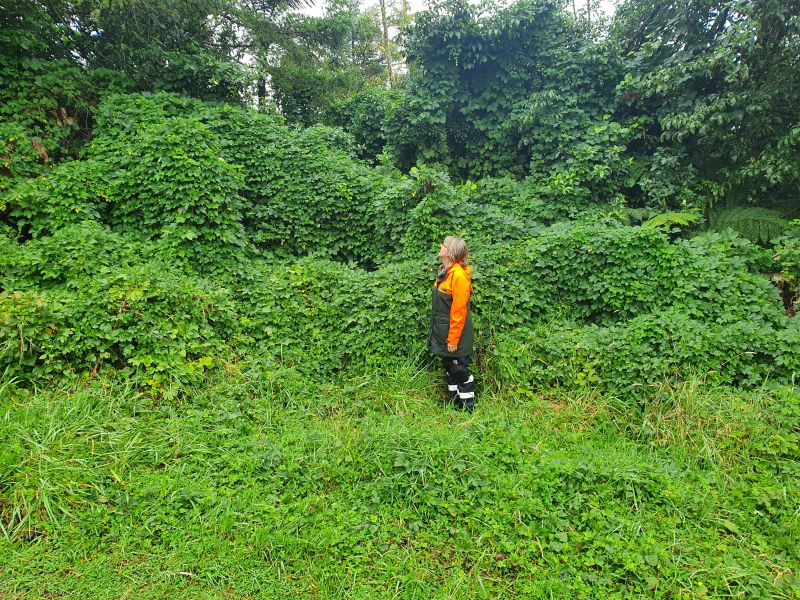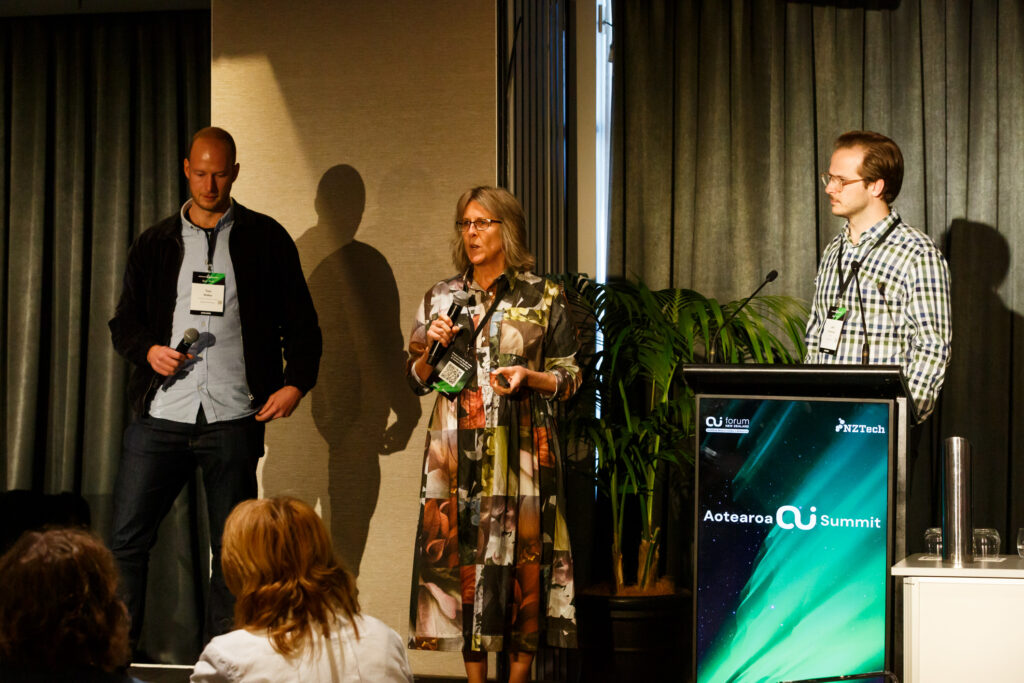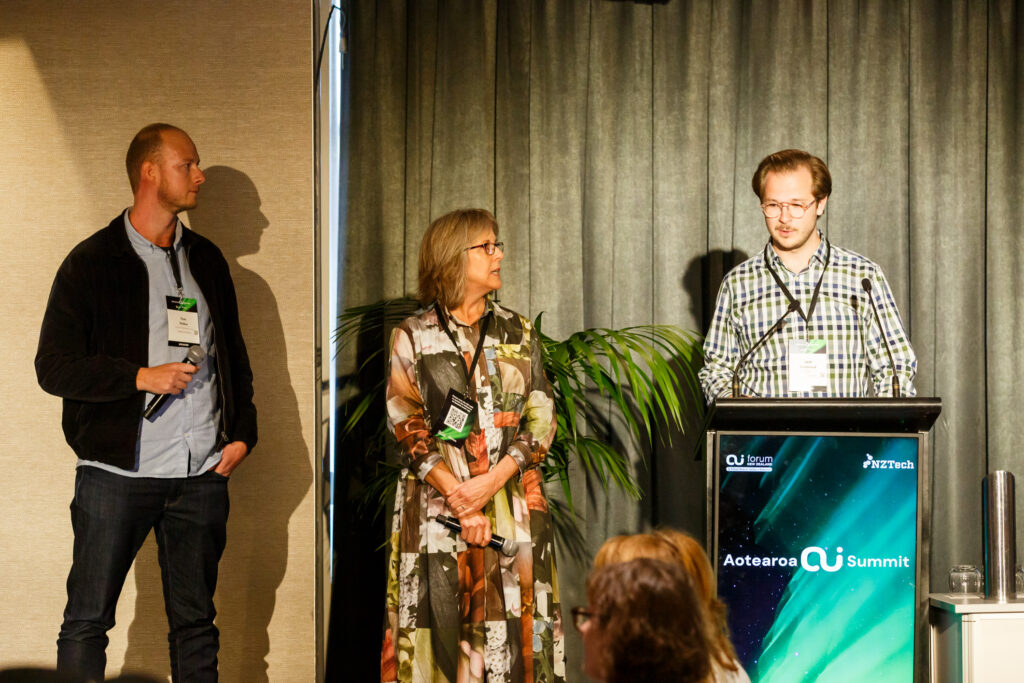04 JULY 2024
AI Hackathon win converts to real-world success

In an inspiring turn of events, the 2023 AI Hackathon has been a catalyst for innovation! Plus, Kate McAlpine, a member of last year’s national winning team shares advice for first-time hackers.
Every year, New Zealand spends $50 million controlling weeds that impact our native ecosystems. Weed ecologist Kate McAlpine and technical lead Nigel Charman have collaborated on a groundbreaking solution for weed surveillance.
“The best way to reduce weed control costs and avoid weed impacts is to detect new weeds when they first start to invade,” says Kate.
The Smart Weed Alert Tool (SWAT) innovation began at last year’s AI Hackathon and exemplifies how collaboration and a shared passion for solving real-world problems can lead to groundbreaking solutions.
Finding the Right Team
Last year, Kate attended the New Zealand Biosecurity Institute’s annual conference where AI Forum’s Madeline Newman introduced the AI Hackathon. She encouraged those with an environmental problem requiring a tech solution to get involved. Kate admits she barely knew what a hackathon was, but it was a call to action. She was prepared to attend and participate either as a subject matter expert or join a team. On the day, she joined a newly created team who recognised her expertise and the urgency of weed-related challenges. United by a common goal, they began to address the pressing issue of invasive weeds.
Why Weeds?
“Weeds can have major negative impacts on our native species and biodiversity, and can be difficult and expensive to control,” says Kate.
“I’ve been studying environmental weeds for more than 20 years, so I knew only too well that there were several real weed problems that needed a technical solution.”
This realisation was the driving force behind the team’s project and the objective was clear: develop a solution to combat the environmental havoc caused by weeds effectively. Their solution and winning pitch was called Deepweed.
From AI Hackathon win to real-world application
Following their victory at the 2023 AI Hackathon, the team’s project evolved in a new direction. Currently, the team is participating in the 2024 GovTech Accelerator run by CreativeHQ in Wellington, developing a prototype for the Smart Weed Alert Tool. Creating a completely new tool that will really make a difference detecting new weeds before they become widespread is rewarding, says Kate.
The vision behind SWAT SWAT is poised to revolutionise weed control in New Zealand. By detecting new weeds at their nascent stage, SWAT aims to prevent them from spreading, reducing costs and mitigating ecological damage.
Inspired by the urgent need for such technology, co-creators Nigel and Kate envision tailored alerts based on user-defined criteria. The tool automatically scans new exotic plant records on platforms like iNaturalist and the Global Biodiversity Information Facility (GBIF). When a new record aligns with a user’s alert parameters—such as the first sighting of a serious weed in their region—the user receives an immediate notification.
Overcoming Challenges
Despite its promising potential, developing SWAT has not been without challenges. Kate says wrangling all the data has been one of the biggest hurdles so far. However, the team’s perseverance is driving them forward. They aim to develop the prototype into a fully functional tool and make it open source, ensuring it is freely available to any individual, organisation, or group involved in weed management in New Zealand.
Advice for aspiring hackers
“Just give it a go—even if you’ve never done one before. You might just succeed in creating something real,” says Kate.
If you haven’t already registered for the 2024 AI Hackathon, find your nearest location here.
Every year, New Zealand spends $50 million controlling weeds that impact our native ecosystems. Weed ecologist Kate McAlpine and technical lead Nigel Charman have collaborated on a groundbreaking solution for weed surveillance.
“The best way to reduce weed control costs and avoid weed impacts is to detect new weeds when they first start to invade,” says Kate.
The Smart Weed Alert Tool (SWAT) innovation began at last year’s AI Hackathon and exemplifies how collaboration and a shared passion for solving real-world problems can lead to groundbreaking solutions.
Finding the Right Team
Last year, Kate attended the New Zealand Biosecurity Institute’s annual conference where AI Forum’s Madeline Newman introduced the AI Hackathon. She encouraged those with an environmental problem requiring a tech solution to get involved. Kate admits she barely knew what a hackathon was, but it was a call to action. She was prepared to attend and participate either as a subject matter expert or join a team. On the day, she joined a newly created team who recognised her expertise and the urgency of weed-related challenges. United by a common goal, they began to address the pressing issue of invasive weeds.
Why Weeds?
“Weeds can have major negative impacts on our native species and biodiversity, and can be difficult and expensive to control,” says Kate.
“I’ve been studying environmental weeds for more than 20 years, so I knew only too well that there were several real weed problems that needed a technical solution.”
This realisation was the driving force behind the team’s project and the objective was clear: develop a solution to combat the environmental havoc caused by weeds effectively. Their solution and winning pitch was called Deepweed.
From AI Hackathon win to real-world application
Following their victory at the 2023 AI Hackathon, the team’s project evolved in a new direction. Currently, the team is participating in the 2024 GovTech Accelerator run by CreativeHQ in Wellington, developing a prototype for the Smart Weed Alert Tool. Creating a completely new tool that will really make a difference detecting new weeds before they become widespread is rewarding, says Kate.
The vision behind SWAT SWAT is poised to revolutionise weed control in New Zealand. By detecting new weeds at their nascent stage, SWAT aims to prevent them from spreading, reducing costs and mitigating ecological damage.
Inspired by the urgent need for such technology, co-creators Nigel and Kate envision tailored alerts based on user-defined criteria. The tool automatically scans new exotic plant records on platforms like iNaturalist and the Global Biodiversity Information Facility (GBIF). When a new record aligns with a user’s alert parameters—such as the first sighting of a serious weed in their region—the user receives an immediate notification.
Overcoming Challenges
Despite its promising potential, developing SWAT has not been without challenges. Kate says wrangling all the data has been one of the biggest hurdles so far. However, the team’s perseverance is driving them forward. They aim to develop the prototype into a fully functional tool and make it open source, ensuring it is freely available to any individual, organisation, or group involved in weed management in New Zealand.
Advice for aspiring hackers
“Just give it a go—even if you’ve never done one before. You might just succeed in creating something real,” says Kate.
If you haven’t already registered for the 2024 AI Hackathon, find your nearest location here.


Copyright © 2023 AI Hackathon. Presented by AI Forum NZ.
